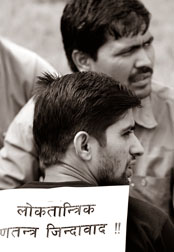|
dailynews |
|
|
|
|
|
OTHER LINKS |

|

|

|
Nepal:Trust as the precondition for political normalcy
The Maoist "cannot be given the status of a political party.... until they give up weapons," Nepalese Prime Minister Girija Prasad Koirala was quoted saying. He went on to say that his administration was trying its best to "create the right kind of environment" for the laying down of arms by the Maoists. Only time would tell what this "right kind of environment" would consist of. However, kindred experiences in other parts of South Asia should point to the need to build absolute trust and confidence between the antagonists in Nepal. Trust between the parties in conflict has emerged as one of the most essential preconditions of smooth conflict resolution. This is true of all the world's trouble spots, including, of course, those seeming to defy resolution in South Asia.
The next step in the political normalization process of Nepal is the conduct of the Constituent Assembly, which is charged with drawing-up a new constitution for Nepal. The Nepali Congress-led political alliance and the Maoists could be said to have fought a common enemy some months back in the form of the Nepalese monarch. The aim of disempowering the monarch has been achieved but the most daunting challenge in the political normalization process in Nepal is just emerging in the form of a power-sharing deal between the Nepali-Congress-led coalition of parties-representing the conservative and dominant social groups in the Nepalese polity - and the Maoists representing the less powerful groups and marginalized elements in it, including the poor, the depressed castes and tribals. Accordingly, the acid test for the contending parties will take the form of negotiations leading to a power-sharing arrangement which would satisfy the basic aspirations of the antagonists. Until such an agreement is concluded and given sufficient legitimacy through its incorporation in a new constitution, the chances are remote that the Maoists would consider laying - down arms. Even so, it is the full implementation of such an agreement which would enable the Maoists to consent to an arms demobilizing accord. Accordingly, it would be unrealistic for the Nepali Congress - led administration to expect the Maoists to readily consent to a downing of arms right now. First, the constitution-making process needs to get underway and the Maoists would need to see for themselves that power-sharing is becoming a reality in Nepal. Until then, the incoming UN team would need to ensure that the cessation of hostilities holds between the contenders for power. Fresh armed friction between the parties would certainly undermine the process of political normalization. |
 Trust: It is a question of trust all over again. The blood-letting
has ceased to a degree in Nepal and the Nepali Congress - led seven
party alliance is due to work in collaboration with the Maoist rebels
towards bringing political normalcy to Nepal, but there does not seem to
be accord between the parties on the issue of demobilizing rebels' arms.
Trust: It is a question of trust all over again. The blood-letting
has ceased to a degree in Nepal and the Nepali Congress - led seven
party alliance is due to work in collaboration with the Maoist rebels
towards bringing political normalcy to Nepal, but there does not seem to
be accord between the parties on the issue of demobilizing rebels' arms.









